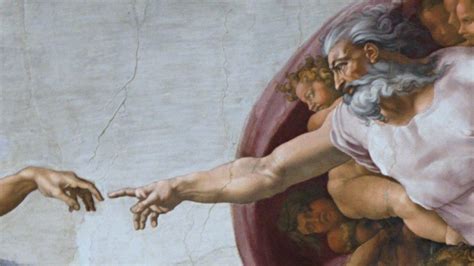Jesus
The Desire for God is written in the human heart, because man is created by God and for God; and God never ceases to draw man to Himself. Only in God will he find the truth and happiness he never stops searching for.[1]
Who is Jesus?
Jesus is the second person of the Holy Trinity. He is the fulfillment of God Our Father’s promise to mankind. Because Jesus became man and walked among us, He is the face of God that we find the most approachable. To know Jesus, it is necessary to read scripture.
The Word
“In the beginning was the Word and the Word was with God; and the Word was God” (Jn 1:1). John introduces us to Jesus as “The Word.” Before Jesus became a man, He existed as the Word. He first revealed Himself to the world as the Word of Sacred Scripture. The Bible was divinely inspired and through reading The Word, we come to know Jesus. Because the Word in Scripture is Jesus, the Church venerates the scripture. This scripture is not a design of human plan and thought, it is a communication from God Himself. God is the author of Scripture and He reveals Himself to us through it.[2] It is because these words are from God that man cannot undertake to change the words or remove verses or entire books from the Bible (Rv 22:18-19). The Bible in its entirety is the truth; to change scripture is a distortion of the truth and distorts our understanding of the person of Jesus.
Why did Jesus decide to become man? St. John tells us the reason: “In Him was life, and the life was the light of men. And the light shines in the darkness; and the darkness grasped it not” (Jn 1:4-5). Jesus is our life. Through Him we have eternal life (1 Jn 5:11-13). We had lost our eternal life through our sin, so Jesus came to earth to restore life to us. Because the penalty for sin is death, Jesus came to pay the penalty for our sin by dying in our place. In His resurrection, He also restored our life to us. In the Memorial Acclamation of the Mass, we proclaim “Dying you destroyed our death, rising you restored our life.[3]” This is why Jesus came to earth. We had lost our way in the darkness of our sin and He came to show us the light, to lead us to salvation (Jn 4:9).
The Holy Name of Jesus
When the time came for Jesus to enter the world, God sent His angel Gabriel to a young virgin named Mary. He said to her, “Behold thou shalt conceive in thy womb and shalt bring forth a son and shalt call His name Jesus” (Lk 1:31). The name “Jesus” means “savior.” He was given this name by God because He was sent to save the people from their sins. Therefore, every time we pronounce the Holy Name of Jesus, we give God glory because we offer Him all the infinite merits of the Passion and Death of Jesus.[4]
Simply speaking the Name of Jesus is a prayer. The devil hates the name of Jesus so much that when we speak the name of Jesus in petition to God, we can overcome many temptations. In times of sorrow, speaking the name of Jesus brings us comfort because He who suffered more than any man comes rushing to our side to comfort us. When we desire to love Him more, we can speak His Name and He comes to us and He fills us with His love and His peace.
The King of Kings
Jesus came to establish God’s kingdom of love here on earth (from the Our Father). In Heaven, Jesus is recognized as King. In time, all people will recognize that He is King (Phil 2:9-10). Jesus is our king because He is the Son of God, but He is also a king in the human sense. He is the direct descendent of David, the anointed king of Israel. His lineage and rightful claim to the throne of David is given to us in scripture. In the Gospel of Matthew (1:1-16), we are given the lineage of Jesus through Joseph, His virgin father. Joseph was a descendent of David through David’s son Solomon. Although Joseph was not genetically Jesus’s father, he was legally Jesus’s father because he was the husband of Mary. Therefore, the throne would have passed from Joseph to Jesus.
In the Gospel of Luke (3:23-38), we are given the lineage of Jesus through Mary. Verse 38 states that Joseph was the son of Heli. This was a common practice when referring to a son-in-law. In the time this Gospel was written, the Jews never referred to the woman’s name, so when Mary’s lineage is given, they referred to her husband as the “son.” (We can distinguish the difference between the lineage in the Gospels because Matthew uses the word “begat.” This means that the father is the genetic father of the son. Luke simply says “son of” which in Hebrew times was a recognition of any legal father-son relationship, such as that of “son-in-law.”) The name of Heli is the same as Mary’s father’s more well-known name Joachim. (This interpretation of scripture was given by St. Augustine and St. Jerome.)[5] Mary is a direct descendent of David through David’s son Nathan on her father’s side. It is also a common opinion of the Doctors of the Church that Mary’s mother, Anne, was the sister of Joseph’s father Jacob, thus, Mary was also a descendent of David through Solomon on her mother’s side.[6]
In understanding that Jesus was in the line of kings from both sides of His family, we recognize that He was the rightful King of Israel. He is the king of Kings because His kingship surpasses the kingship of all His predecessors. Of all the kings of Israel He is the most glorious because His kingdom is eternal. Of all the powerful kings that ever existed, He alone can grant eternal peace in His kingdom and eternal life to all who bow down to Him and glorify His Name.
The Good Shepherd
Jesus who came in perfect humility, did not announce Himself as our King in order for us to bow down to Him. He called Himself Our Shepherd and referred to us as His sheep because He wanted us to love and trust Him (Jn 10:1-18). In this parable He says, “I am the good shepherd, and I know mine and mine know Me” (Jn 10:14). To understand this parable, it helps to understand the customs of the time. In those days, the shepherds would gather all their sheep into one barn at night. In the morning, the shepherds would come to the sheepfold and call out each sheep by name. Each shepherd had a name for each sheep and could distinguish his sheep from the others. The sheep each knew the voice of their own shepherd. The sheep would not leave the sheepfold until they heard their own shepherd’s voice calling their own name. Then, the sheep would follow their shepherd to their pasture where they would graze for the day.
Jesus uses this image as the shepherd to show us how much He loves us. Each of us is a unique individual that is precious to Him. When He tells us, “I have called you by name,” that is exactly what He means. When He says that the good shepherd lays down his life for his sheep, He is foretelling what He intends to do for us (Jn 10:14-15). He is so full of love for us that He never wavered in His mission. He came to save us, and that is exactly what He did.
The Lamb of God
Jesus is also referred to as the “Lamb of God.” After the consecration of the Mass when Jesus is present on the altar, we address Him with the prayer: “Lamb of God you take away the sins of the world, have mercy on us.”
The image of the lamb comes to us from a rich tradition in Hebrew scripture. The first sacrifice of the lamb was celebrated at the first Passover in the book of Exodus. Moses went to Pharaoh on God’s authority and asked him to free the Israelite slaves. Pharaoh refused several times and after each refusal the plagues that descended on Egypt grew worse and worse. The final plague was the death of the firstborn of every family –humans and animals alike. Before this plague occurred, Moses instructed the Israelites to take a spotless lamb, slaughter it, then smear the blood of the lamb over their doorways (Ex12:7). The angel of death would “pass over” (this is where the word “Passover” comes from) all the houses that were covered with the blood of the lamb and they would be saved from death (Ex 12:13).
The Passover occurred again – physically and spiritually – on Good Friday. Jesus is the spotless lamb, the One untouched by any stain of sin, who was sacrificed. It is His Blood that covers us, just as the lamb’s blood covered the doorway of the Israelites’ homes. Because He covers us with His Blood and removes our sin, we escape from eternal death (hell).
Why was Jesus willing to die for us? Because He loves us. All things were created through Him (Jn 1:13) because of His infinite love. He gave us life and we destroyed it. Because He could not bear the thought of eternity without His beloved people, He gave life back to us by His own death and resurrection. It is in contemplating His suffering and death for us that we begin to understand the depth of His love for us.
Recommended Reading
First Epistle of John
The Wonders of the Holy Name by Fr. Paul O’Sullivan, O.P.
Catechism of the Catholic Church: Sacred Scriptures (paragraphs 101-133) and Jesus Christ (paragraphs 422-478).
[1] Catechism of the Catholic Church, Liguori Publications, paragraph #27.
[2] Ibid., #104.
[3] This article was originally published by the author in 1996. In the Revised Roman Missal in 2010 this Memorial Acclamation was changed to: “Save us, Savior of the world, for by your Cross and Resurrection you have set us free.”
[4] The Wonders of the Holy Name, by Fr. Paul O’Sullivan O.P., Tan Books and Publishers, Inc. p.3.
[5] The Life and Glories of St. Joseph, by Edward Healy Thompson, Augustine Publishing Co., chapter 3.
[6] Ibid., chapter 3.




